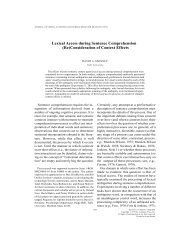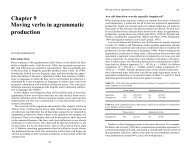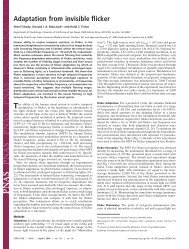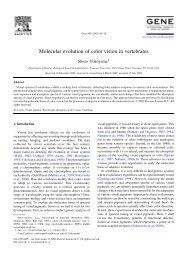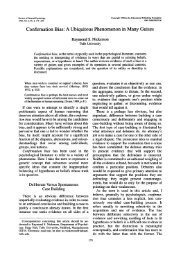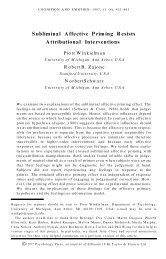4 Lexical Processing and Sentence Comprehension in Aphasia
4 Lexical Processing and Sentence Comprehension in Aphasia
4 Lexical Processing and Sentence Comprehension in Aphasia
Create successful ePaper yourself
Turn your PDF publications into a flip-book with our unique Google optimized e-Paper software.
4. LEXICAL PROCESSING AND SENTENCE COMPREHENSION 135neuroscience-the distance between descriptions of the functional architectureof language <strong>and</strong> descriptions of its (presumably hardwired) neurologicalresources.ACKNOWLEDGMENTSThe research reported <strong>in</strong> this chapter was supported <strong>in</strong> part by NS 11408<strong>and</strong> NS 06209 to the <strong>Aphasia</strong> Research Center, Department of Neurology,Boston University School of Medic<strong>in</strong>e, by NS 21806 to Br<strong>and</strong>eis University,<strong>and</strong> by a grant from the Sloan Foundation to the MIT Cognitive ScienceCenter.REFERENCESBadecker, W., & Caramazza, A. (1985). On considerations of method <strong>and</strong> theory govern<strong>in</strong>gthe use of cl<strong>in</strong>ical categories <strong>in</strong> neurol<strong>in</strong>guistics <strong>and</strong> cognitive neuropsychology: The caseaga<strong>in</strong>st agrammatism. Cognition, 20, 97-125.Berndt, R. S., & Caramazza, A. (1980). A redef<strong>in</strong>ition of the syndrome of Broca's aphasia:Implications for a neuropsychological model of language. Applied Psychol<strong>in</strong>guistics, 1,225-278.Bradley, D. (1978). Computational dist<strong>in</strong>ctions of vocabulary type. Unpublished doctoral dissertation,Massachusetts Institute of Technology, Cambridge, MA.Bradley, D., & Garrett, M. (1983). Hemisphere differences <strong>in</strong> the recognition of closed <strong>and</strong>open class words. Neuropsychologia, 21, 155-160.Bradley, D., Garrett, M., & Zurif, E. B. (1980). Syntactic deficits <strong>in</strong> Broca's aphasics. InD. Caplan (Ed.), Biological studies of mental processes (pp. 269-286). Cambridge, MA:MIT Press.Caramazza, A. (1984). The logic of neuropsychological research <strong>and</strong> the problem of patientclassification <strong>in</strong> aphasia. Bra<strong>in</strong> <strong>and</strong> Language, 21, 9-20.Coltheart, M., Patterson, K., & Marshall, J. (Eds.). (1980). Deep dyslexia. London:Routledge & Kegan Paul.Drenowski, A., & Healy, A. (1977). Deletion errors on "the" <strong>and</strong> "<strong>and</strong>": Evidence for read<strong>in</strong>gunits larger than the word. Memory <strong>and</strong> Cognition, 8, 636-647.Egido, C., & Garrett, M. (1981). Frequency contrasts for open <strong>and</strong> closed class words on auditorylexical decision. Unpublished manuscript, Massachusetts Institute of Technology, PsychologyDepartment, Cambridge, MA.Fodor, J. (1983). The modularity ofm<strong>in</strong>d. Cambridge, MA: MIT Press.Forster, K. 1. (1979). Levels of process<strong>in</strong>g <strong>and</strong> the structure of the language processor. InW. Cooper & E. C. T. Walker (Eds.), <strong>Sentence</strong> <strong>Process<strong>in</strong>g</strong>. Hillsdale, NJ: LawrenceErlbaum Associates.Friederici, A. D. (1983). Aphasics' perception of words <strong>in</strong> sentential context: Some real-timeprocess<strong>in</strong>g evidence. Neuropsychologia, 21, 351-358.Garcia-Albea, J., & Sanchez-Casas, Y. R. (1983). Language processes: Comparative psychol<strong>in</strong>guisticstudies <strong>in</strong> word recognition. F<strong>in</strong>al Research Report for the Jo<strong>in</strong>t Spanish NorthAmerican Committee for Cultural <strong>and</strong> Educational Exchange.Goodglass, H., & Kaplan, E. (1972). The assessment ofaphasia <strong>and</strong> related disorders. Philadelphia:Lea & Febiger.



